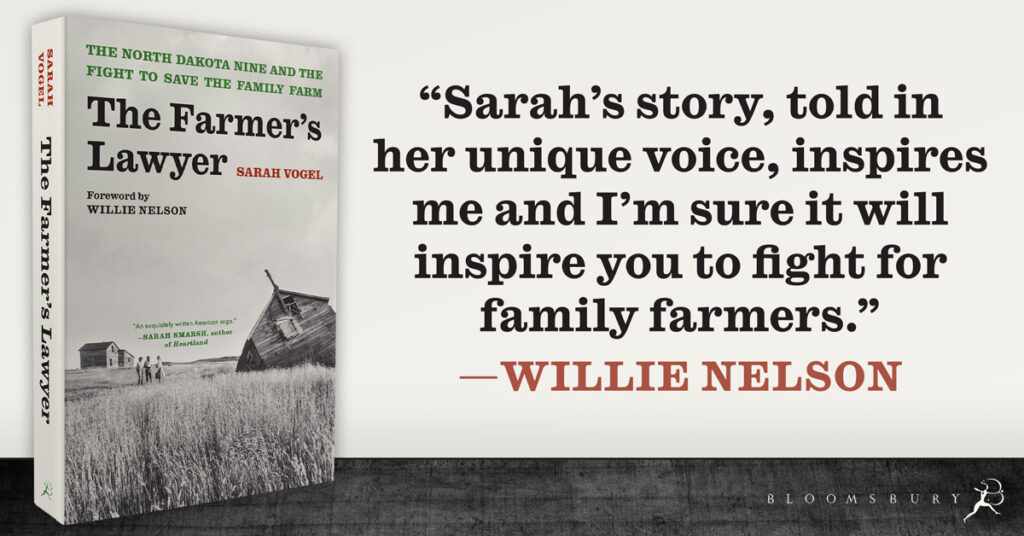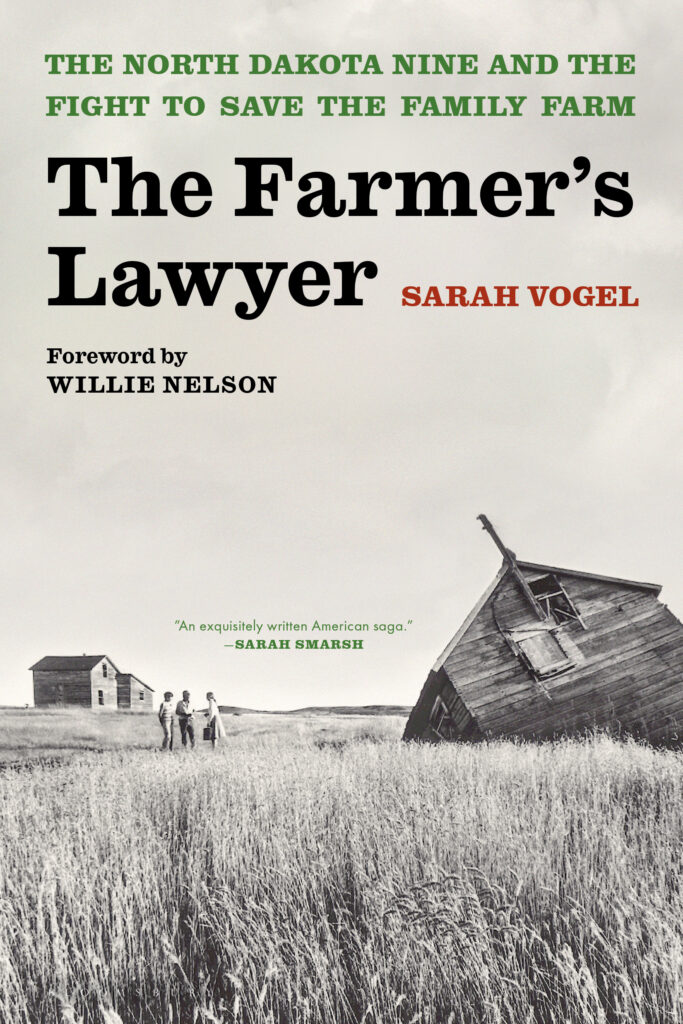Sarah Vogel’s Fight for Family Farms
If you were to compile a list of essential readings for farmers, farm advocates and people interested in agriculture, Sarah Vogel’s The Farmers Lawyer: The North Dakota Nine and the Fight to Save the Family Farm would top it. This story of a young attorney and her lawsuit on behalf of farm families is many things: a compelling memoir; an important history lesson; a crash course in law; an epic David vs Goliath struggle; and a warning for us all about the challenges farmers continue to face that threaten their very existence. The paperback edition of the book was released this week, with a new foreword from Willie Nelson. And, remarkably, John C. Reilly has recorded Willie’s words in a reading of the foreword. Listen here:
Sarah’s story begins in the early 1980s, with farmers suffering the worst economic crisis to hit rural America since the Great Depression. Land prices were down, operating costs and interest rates were up, and severe weather devastated crops. Rather than assisting farmers, the newly elected Reagan Administration made a plan to push them into foreclosure under the guise of dramatically reducing government spending. The Grand Doctrine, as it was known, was dreamed up by David Stockman, Reagan’s young director of the Office of Management and Budget. His goal: “abruptly severing the umbilical cords of dependence that ran from Washington to every nook and corner of the nation,” requiring “ruthless dispensation of short-run pain” to every corner of the federal budget—farm programs, nutrition and school lunch programs, legal services—in the name of future gain to the economy. Finding willing partners in John Block, Secretary of Agriculture, and Charles Shuman, National Administrator of Farmers Home Administration (FmHA), Stockman led the charge to eliminate farm loan delinquencies. By the end of 1981, FmHA had commenced 2,195 foreclosures and sent out 13,318 acceleration letters, demanding that farmers pay their delinquent loans in full or prepare to face foreclosure.
For folks who work with and support Farm Aid and our partners like RAFI-USA, The Farmer’s Lawyer is a glimpse into the critical work that farm advocates, like RAFI’s Benny Bunting, do every day. The roots of Benny’s work are deep in the ground of the 1980s Farm Crisis, when farmers rose up to save their farms and the farms of others, learning how to, as Sarah puts it, “help farmers and ranchers navigate the maze of FmHA [known now as Farm Service Agency (FSA)] rules and regulations.” Speaking of one such advocate who trained hundreds of others, Sarah says, “He knew FmHA regulations better than most FmHA employees did, and he freely shared his techniques and knowledge with other farmers.” The network of farmers and advocates like Benny who have such integral knowledge remains essential to farmers to this day.
Sarah’s case depended on these details, including knowing what rights farmers have in their dealings with FmHA, including the right to an appeal and the right to obtain the records FmHA keeps about you and your farm. As Benny can tell you, Sarah’s lawsuit challenging FmHA’s foreclosure processes in North Dakota, and eventually across the country as she won certification of all 240,000+ FmHA farm loan borrowers as a class for a class action lawsuit, is every bit as relevant today. To this day, farmers struggle to know their rights as farm borrowers, and to receive fair and equitable treatment. Sarah explains, “My main strength was naivete. I was a solo practitioner proposing a lawsuit against the U.S. government, which was represented by thousands of lawyers who fought hard and hated to lose. USDA was an ogre—big, mean and nasty. Yet I believed I could defeat it.”
Though she had trained to be a lawyer, Sarah came to the case much like the farm advocates she mentions in her book: by necessity. Sarah was recruited by farmers who asked her to take up their case. Suffering from financial hardship and the imminent loss of their farms, they could not pay legal fees. Many of them bartered, offering carpentry services, eggs and homemade jam in exchange for her representation. For Sarah, there was no option to say no; she had been raised in a household that ingrained in her the essential value of farmers. Sarah put her farmer plaintiffs first, forsaking her personal financial security and her discomfort with litigating a case in court—a thing she’d never planned to do.
Sarah’s legal argument relied on the decision in Goldberg v. Kelly, the U.S. Supreme Court case that had protected mothers receiving welfare benefits from being cut off from those benefits without a prior hearing. Sarah saw its precedent in the cases of the farmers she represented, who were cut off from their farm loans without a hearing, denied funds for food, electricity, feed for their animals and other essential living and operating expenses. The brilliance of Sarah’s logic was in demonstrating that another suit, United States v. Kimbell Foods, Inc., showed that the court had previously found that FmHA’s loan programs were “a form of social welfare, primarily designed to assist farmers and businesses that cannot obtain funds from private lenders on reasonable terms.” In that decision, the judge had written, “For qualified recipients, welfare provides the means to obtain essential food, clothing, house and medical care… [Thus] termination of aid pending resolution of a controversy over eligibility may deprive an eligible recipient of the very means by which to live while he waits.”
This ruling that FmHA’s program was a “social welfare” program, not merely a business enterprise of lending capital, recalled FmHA’s origins during the Great Depression as an organization with a mission to help struggling tenant and dispossessed farmers. They just hadn’t been practicing that way—until Sarah came along. In the final ruling of Coleman v. Block, Sarah’s lawsuit representing more than 240,000 farmers, the final permanent injunction stated:
“Before any liquidation, foreclosure, freeze of income, or similar action could be taken, FmHA had to provide at least thirty days’ written notice of its intentions to the farmer. This notice had to tell the farmer that she or he had a right to a hearing and also had to give the reason for the proposed liquidation or termination.”
In the Agricultural Credit Act of 1987, Congress incorporated the provisions of the Coleman decision, including “due process, notice, fair hearings, and release of income – into the permanent law along with scores of other protections and safeguards,” effectively putting an end to the Farm Crisis of the 1980s. But as Sarah urgently warns in the preface,
“I never thought that our present farm crisis would come as soon as the 2020s. There was a fifty-year gap between the 1930s and 1980s farm crises, but this one is occurring on a much faster trajectory. Further, it seems likely that the farm crisis of the 2020s might be worse than its predecessors because it will coexist and overlap with climate change, hunger and food insecurity, unemployment, multiple federal, state and local budget shortfalls, a ‘red state’ and ‘blue state’ political divide, and the economic and social aftershocks of the terrible world-wide Covid-19 pandemic.”

That makes The Farmer’s Lawyer a must-read for everyone who cares about food and farming. The paperback was released on September 19.
Further Reading
Learn more about The Farmer’s Lawyer.
Next
Farm Aid 2023 Merch



